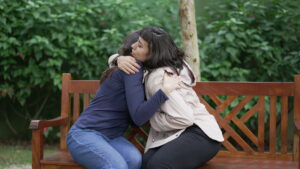 Dealing with grief and loss is a reality we all must confront at some point. The experience of grief is different for everyone, and it has no timetable. Grieving, however, is a necessary part of the coping and healing processes.
Dealing with grief and loss is a reality we all must confront at some point. The experience of grief is different for everyone, and it has no timetable. Grieving, however, is a necessary part of the coping and healing processes.
The recent death of a friend’s son has created within me a vision of the world through which only the lenses of my eyes can see and the beat of my heart can feel. His death has inspired the desire and passion to live my best life every day while giving service to others. This could have easily gone the opposite way, leading to feelings of utter isolation, depression, and loneliness.
For all the pain it brings, grief holds many lessons:
- Grief teaches us that loss is inevitable.
- Grief teaches us not to take loved ones for granted.
- Grief teaches us about our faith.
- Grief teaches us to be patient.
- Grief teaches us that we should live every day creating memories that will comfort us after our loved ones are gone.
- Grief teaches us about our feelings.
- Grief teaches us that it is necessary to grieve. It allows us to move forward.
- Grief teaches us to find our purpose in life.
- Grief teaches us that pain and joy can coexist.
- Grief teaches us to be true to ourselves.
What has your grief taught you?
The Kübler-Ross Model of Grief
Loss can leave us with a wide range of emotions. The experience of each emotion signals that a deep bond has been broken. One day we may be in denial, anger, or depression. Other days, we might feel like we can go on. Until, that is, the cycle starts all over again.
In her 1969 book On Death and Dying, psychiatrist Elisabeth Kübler-Ross introduced what came to be known as the “five stages of grief,” which represent the typical series of experiences for those who have faced loss:
- Denial: “This isn’t happening.”
- Anger: “How could this happen?”
- Bargaining: “Please make this not happen. In return I will ___.”
- Depression: “I’m too sad to do anything.”
- Acceptance: “I’m finally at peace with what happened.”
As stated earlier, each person experiences grief in different ways. Thus, it’s important to emphasize that while the Kübler-Ross model serves as a general guide for how grief is often processed, not everyone experiencing grief or loss may experience every stage, let alone in order.
How to Help a Grieving Friend
If someone you know has lost a loved one, the following suggestions may help:
- Listen: Follow the advice of musician Michael McLean. When someone is grieving, “show up and shut up.” The grief-stricken person needs to be heard and feel that someone cares. Grief is a personal experience, an experience that belongs solely to the person experiencing it, and you must allow them the respect and time they deserve. Listening to someone who grieves is an invaluable gift.
- Be a gatekeeper: In an intensely painful and overwhelming time, offer to be the person through which information is filtered for dissemination. You may find that other friends, family members, and acquaintances ask for information about your friend. Normalize grief with responses such as, “They have good days and bad days—and probably will for a long time.” Or, “Grief never really ceases. It is something you carry with you in different ways for the rest of your life.”
Getting Support for Grief
The grieving process can be long and lonely. If you are grieving, take the time you need, meet any challenging emotions that arise within you with self-compassion, and accept support from others. Talking about grief is an important part of healing. Receiving reassurance and feeling empathy expressed for your loss may help make the recovery process seem a little less daunting. If you need or desire further support, I strongly encourage you to contact a licensed therapist who works with grief and loss.
References:
- Kübler-Ross, E. (1969). On death and dying: What the dying have to teach doctors, nurses, clergy, and their own families. New York: Macmillan.
- McLean, M. (n.d.). Hoping. Retrieved from http://www.michaelmcleanmusic.com/page/47

The preceding article was solely written by the author named above. Any views and opinions expressed are not necessarily shared by GoodTherapy.org. Questions or concerns about the preceding article can be directed to the author or posted as a comment below.

 Grieving on the Job: Navigating Professional Life Amid Grief
Grieving on the Job: Navigating Professional Life Amid Grief Learning How to Grieve When the World Moves On
Learning How to Grieve When the World Moves On Can I Grieve If Nobody Died?
Can I Grieve If Nobody Died?

Please fill out all required fields to submit your message.
Invalid Email Address.
Please confirm that you are human.
Leave a Comment
By commenting you acknowledge acceptance of GoodTherapy.org's Terms and Conditions of Use.